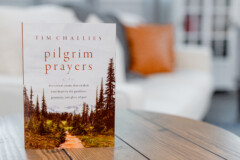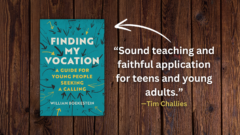Christians have a complex relationship to suffering. We do not wish to experience suffering. It is not our desire, preference, or longing to go through times of pain and persecution, times of sorrow and loss. Yet we also know that God uses such experiences to accomplish significant and meaningful things within us. We know there are certain graces that bloom best in the valleys, certain fruits that ripen best in the winter, certain virtues that come to fruition most often in the shadows.
We want to be “perfect and complete, lacking in nothing,” yet James make it clear that the way to these graces does not pass around trials and tests, but through them. We want our faith to be tested and proven genuine, yet Peter tells us that we gain this confidence not when we avoid trials, but when we are grieved by them. We want to be able to offer comfort to Christians who are enduring times of sorrow, yet Paul tells us that it is precisely through receiving comfort in our pains that we become specially equipped to comfort others (James 1:4ff; 1 Peter 1:6ff; 2 Corinthians 1:4). A host of Christians will testify that they have come to know the Lord more intimately, they have come to put sin to death more earnestly, they have been equipped to serve more thoroughly, not apart from their suffering, but because of it.
And, indeed, as we look back at our own lives, we often see evidence of the ways God has worked in us through our hardest times. We see how it was when a loved one was taken from our side that we truly grew closer to the Lord, how it was when our wealth disappeared that we came to treasure God more fully, how it was when our bodies weakened that our reliance upon God grew. We see that God really does purify us through the fire, that he really does strengthen us in our weaknesses, that he really does sanctify us through our sorrows. Though we do not emerge from our trials unscathed, we still emerge from them better and holier and closer to him. Though we wish we did not experience such sorrows, we are thankful to have learned what we have learned and to have grown in the ways we have grown.
As I said, Christians have a complex relationship to suffering. And recently I have been pondering how I have a complex relationship to suffering. I have been pondering a kind of conflict that now exists in my heart and mind.
I want Nick back. But I don’t want my old self back. I so badly wish that my son could be part of my life again. But I would so badly hate to lose all the precious ways in which God has been real to me and true to me and present with me in my sorrows. There is so much I have learned, so many ways God has drawn close to me, so many blessings I’ve received from the Lord. And all of these came through sorrow, not apart from it. In some ways my greatest gains have flowed from my greatest loss, my greatest joys from my deepest sorrow.
But I suppose this should not come as a complete surprise, for God often works through paradox. After all, he is the God who says it is the poor rather than the rich who have the greatest wealth, that is those with the deepest hunger who are most satisfied, and that it is those who are persecuted who ought to rejoice and be glad. If in God’s kingdom the way to riches is through poverty and the way to exaltation is through humiliation, wouldn’t it stand to reason that the way to joy passes through sorrow and the way to growth passes through barrenness? Wouldn’t it stand to reason that the way to green pastures passes through dark valleys?
To become who we want we often have to endure what we hate. To receive what we long for we often have to release what we love.
And so we live with this tension: to become who we want we often have to endure what we hate. To receive what we long for we often have to release what we love. To attain the most advanced graces we often need to experience the most painful sorrows.
I need to offer a word of clarity. I do not mean to say that God’s reasoning goes something like this: That guy is not growing in generosity in the way I’d like, so I am going to burn his house down to hasten the process; or that woman is not sufficiently sold out to my purposes so I’m going to take her health to force the issue. No, we need to separate the why from the what, the reason God wills things from what he may be accomplishing through them. We are far too small, far too simple, far too limited to be able to draw firm conclusions about God’s reasons—about why he has willed the difficulties in our lives. “The secret things belong to the Lord our God.” But what we can do and must do is ask, “How might God mean to use this in my life? What is God calling me to through it? How can I become a better Christian because of it?”
Sorrow does not always lead to advances in holiness, but it always can and always should, for the Spirit is present in our sorrows, ready and eager to sanctify them to his precious purposes. Through our sorrows he draws our hearts away from the fleeting pleasures of this earth to set them on the enduring pleasures of heaven. Through our sorrows he shifts our longings from things we cannot possibly keep to things we cannot possibly lose. Through our sorrows he diminishes the traits that mark citizens of the kingdom of this world and he amplifies the character that marks citizens of the kingdom of God.
We don’t wish to suffer. We shouldn’t wish to suffer. Yet we know that none of us escape this life unscathed. And when the time comes that “the path that I feared is the way he has set,” we can be certain that God is eager to sanctify our sorrows in ways that are ultimately for our benefit and for his glory, that behind the mysteries of his providence are wondrous treasures of sanctification, that whatever his reasons, he truly is working all things for good for those of us who are loved by him and called according to his purpose.










